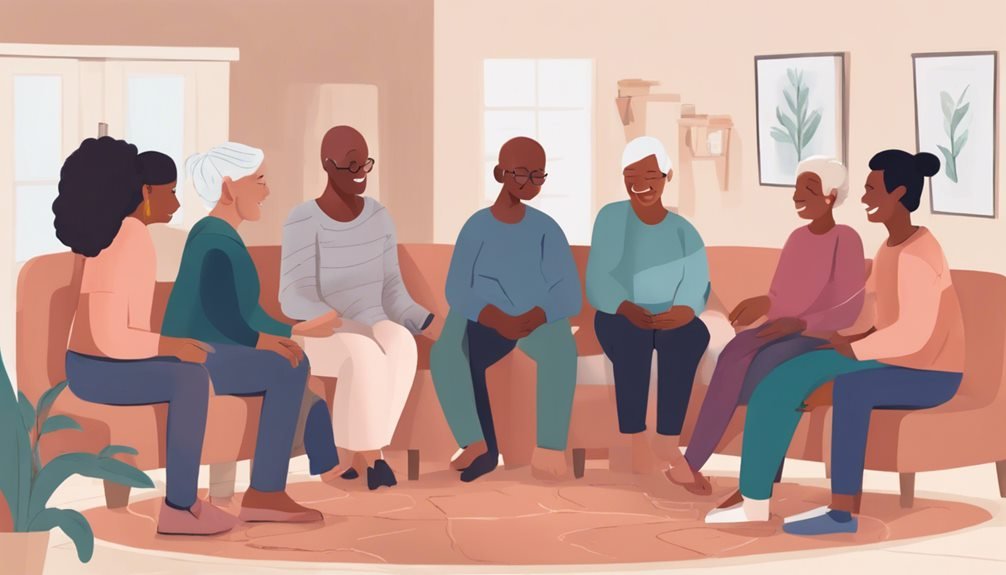When facing the challenges of cancer, managing stress becomes a crucial aspect of your well-being. Exploring various techniques designed to help you cope with the emotional toll of your diagnosis can significantly impact your journey. From mindfulness practices to expressive arts therapies, a range of options exists to support you in navigating the complexities of your situation. By incorporating these strategies into your routine, you may discover a renewed sense of resilience and peace amidst the storm.
Key Takeaways
- Mindfulness meditation reduces anxiety and promotes inner peace.
- Engage in therapeutic expressive arts like journaling and art therapy.
- Practice deep breathing exercises for relaxation and stress relief.
- Seek professional support services such as counseling and cognitive-behavioral techniques.
- Use aromatherapy and acupuncture for calming effects and pain relief.
Mindfulness Practices
If you're a cancer patient looking for effective ways to manage stress, incorporating mindfulness practices into your daily routine can make a significant difference in your well-being.
Mindfulness meditation, a practice that involves focusing your mind on the present moment, can help alleviate feelings of anxiety and worry. By engaging in mindfulness meditation, you can cultivate a sense of inner peace and calm amidst the challenges you may be facing.
Additionally, integrating mindful movement into your day can also be beneficial.
Mindful movement, such as yoga or tai chi, combines gentle physical activity with a focus on breathing and awareness of your body's movements. These practices not only help reduce stress but also promote flexibility, strength, and overall well-being.
Both mindfulness meditation and mindful movement offer you the opportunity to nurture your mind, body, and spirit during this challenging time. By incorporating these practices into your routine, you can enhance your resilience and better cope with the stress that often accompanies a cancer diagnosis.
Deep Breathing Techniques
When facing the challenges of managing stress as a cancer patient, exploring deep breathing techniques can be a valuable addition to your stress management toolkit. Breathing exercises are simple yet powerful tools that can help you cope with the emotional and physical toll of cancer treatment. By focusing on your breath, you can bring a sense of calm and relaxation to your mind and body.
Practicing deep breathing techniques such as diaphragmatic breathing or box breathing can help reduce anxiety, lower your heart rate, and promote a sense of well-being. These relaxation techniques can be done anywhere, at any time, providing you with a quick and effective way to manage stress during difficult moments.
Incorporating deep breathing exercises into your daily routine can also improve your overall quality of life by enhancing your ability to cope with the challenges that cancer presents. Remember, taking a few moments each day to focus on your breath can make a significant difference in how you navigate the stress of cancer treatment.
Guided Imagery

Exploring the practice of guided imagery can offer you a powerful tool to complement your stress management strategies as a cancer patient. Visualization exercises and relaxation techniques can be incredibly beneficial in helping you cope with the challenges you're facing. Here are some key points to consider:
- Create a Peaceful Mental Image: Picture a place or scenario that brings you comfort and peace.
- Engage Your Senses: Use all your senses to make the visualization more vivid and immersive.
- Focus on Positive Outcomes: Visualize a positive outcome related to your health or treatment.
- Practice Regularly: Set aside time each day to engage in guided imagery exercises.
- Combine with Deep Breathing: Incorporate deep breathing techniques to enhance the relaxation effects of guided imagery.
Progressive Muscle Relaxation
Delving into the practice of progressive muscle relaxation can provide you with a valuable technique to manage stress during your cancer journey. This technique focuses on the mind-body connection, recognizing that our mental state affects our physical well-being.
Progressive muscle relaxation involves tensing and then releasing each muscle group in your body, helping to alleviate muscle tension caused by stress.
By consciously tensing and relaxing your muscles, you can become more aware of the physical effects of stress and learn to release that tension. This practice not only helps in reducing muscle tension but also calms your mind, promoting a sense of overall relaxation.
During your cancer journey, when stress levels can be high, incorporating progressive muscle relaxation into your routine can offer a much-needed break and a way to unwind. Through this technique, you can actively participate in your own well-being, empowering yourself to manage stress more effectively.
Journaling for Emotional Release

Understanding the impact that stress can have on your emotional well-being is crucial during your cancer journey. Journaling is a powerful tool that allows for creative expression and self-reflection, aiding in emotional release and stress management. Here are some ways journaling can benefit you:
- Creative Expression: Use your journal as a safe space to freely express your thoughts and emotions without judgment.
- Self-Reflection: Take time to reflect on your experiences, fears, and hopes, gaining insight and understanding.
- Emotional Outlet: Release pent-up emotions by writing them down, providing a healthy outlet for processing feelings.
- Mindfulness Practice: Engage in mindful writing, focusing on the present moment and promoting relaxation.
- Track Progress: Monitor your emotional journey, identifying patterns and recognizing personal growth over time.
Through journaling, you can navigate the complexities of your emotions, finding solace and clarity amidst the challenges of your cancer treatment.
Physical Activity for Stress Relief
Engaging in physical activity is a valuable strategy for managing stress during your cancer journey. Incorporating activities like yoga sessions and outdoor walks can provide not only physical benefits but also emotional relief during this challenging time. Yoga sessions offer a holistic approach to stress relief, combining gentle movements with deep breathing and mindfulness techniques to help calm your mind and body. On the other hand, taking outdoor walks allows you to connect with nature, soak in some sunlight, and release tension through physical movement.
Consider the following table to help you choose the right physical activity for stress relief:
| Activity | Benefits | Tips |
|---|---|---|
| Yoga Sessions | Improves flexibility and reduces stress levels | Find a quiet space to practice |
| Outdoor Walks | Enhances mood and boosts energy levels | Choose scenic routes for added relaxation |
Social Support Networks

Navigating through a cancer diagnosis can be overwhelming, but having a strong social support network can make a significant difference in how you cope with the challenges ahead. During this tough time, it's crucial to lean on your loved ones and seek out additional support. Here are some ways social support networks can help you:
- Group Therapy: Joining a group therapy session can provide you with a safe space to share your feelings and experiences with others who truly understand what you're going through.
- Online Forums: Participating in online forums can connect you with a larger community of individuals facing similar challenges, offering a sense of belonging and empathy.
- Family and Friends: Don't hesitate to reach out to your close circle for emotional support, practical help, or simply a listening ear.
- Support Groups: Attend local support groups to connect with others who can offer advice, encouragement, and companionship on your journey.
- Professional Counseling: Consider seeking the help of a counselor or therapist who specializes in supporting cancer patients to navigate your emotions effectively.
Art Therapy
Art therapy offers a creative and therapeutic outlet for cancer patients to express their emotions and process their experiences through various artistic mediums. Engaging in creative expression through art can be a powerful tool for healing art, allowing individuals to communicate feelings that may be challenging to verbalize.
Whether it's painting, drawing, sculpting, or other forms of artistic expression, art therapy provides a safe space for patients to explore their thoughts and emotions.
Through the process of creating art, cancer patients can find a sense of control and empowerment, helping them cope with the challenges they face during their journey. The act of making art can also promote relaxation, reduce stress, and enhance overall well-being.
Additionally, art therapy can foster a sense of connection and community among patients, providing a supportive environment for self-expression and reflection.
Music Therapy

Music therapy offers a unique and powerful way for cancer patients to tap into the healing power of music. Engaging with music can provide comfort and relief during difficult times. Here are some ways in which music therapy can benefit you:
- Creating Personalized Music Playlists: Tailoring music to your preferences can evoke positive emotions and memories, helping reduce stress and anxiety.
- Listening to Therapeutic Melodies: Certain songs or sounds have the potential to calm your mind and promote relaxation, aiding in managing stress levels.
- Participating in Music Therapy Sessions: Joining group sessions or working one-on-one with a music therapist can offer a safe space to express emotions and find solace in music.
- Exploring Different Genres and Instruments: Experimenting with various types of music and instruments can help discover what resonates best with you for relaxation and comfort.
- Engaging in Active Music Making: Playing an instrument or singing along can be a cathartic way to release emotions and find moments of joy amidst challenging times.
Through music therapy, you can harness the healing properties of music to navigate your cancer journey with more ease and comfort.
Aromatherapy
Incorporating aromatherapy into your stress management routine can provide a soothing and holistic approach to support your well-being during your cancer journey. Aromatherapy involves using essential oils blends and scented candles to create a calming environment that can help reduce anxiety and promote relaxation. Here is a simple guide to get you started with aromatherapy:
| Essential Oil Blends | Scented Candles |
|---|---|
| Lavender oil: known for its calming properties. | Vanilla candles: emit a warm and comforting scent. |
| Peppermint oil: invigorating and refreshing. | Citrus candles: offer a fresh and uplifting aroma. |
| Frankincense oil: promotes a sense of peace. | Sandalwood candles: known for their grounding effect. |
| Eucalyptus oil: helps clear the mind and ease breathing. | Rose candles: provide a delicate and soothing fragrance. |
Experiment with different scents to find what works best for you. Remember, the goal is to create a peaceful sanctuary where you can find moments of relaxation amidst the challenges you may be facing.
Acupuncture and Acupressure

As you explore different avenues to manage stress and promote well-being during your cancer journey, another beneficial option to consider is acupuncture and acupressure. Acupuncture benefits by helping to alleviate pain and nausea commonly associated with cancer treatments. Acupressure effectiveness lies in reducing anxiety and improving sleep quality, crucial aspects of your healing process. Here are some key points to consider:
- Acupuncture can help regulate the body's energy flow, promoting relaxation and reducing stress levels.
- Acupressure techniques target specific pressure points, aiding in pain relief and enhancing overall well-being.
Both acupuncture and acupressure can complement traditional cancer treatments, providing a holistic approach to your care.
These practices are non-invasive and generally safe, offering a natural way to manage symptoms.
Consider consulting with a qualified practitioner experienced in working with cancer patients for personalized treatment plans tailored to your needs.
Exploring acupuncture and acupressure may offer you valuable tools in coping with the challenges of cancer treatment.
Professional Counseling Services
Consider reaching out to professional counseling services as a valuable resource in navigating the emotional challenges that often accompany a cancer diagnosis and treatment. Coping strategies are essential in managing the stress, anxiety, and uncertainty that cancer can bring. Professional counselors can provide a safe space for you to express your feelings, fears, and concerns while offering therapeutic interventions tailored to your specific needs. These trained professionals can help you develop effective coping mechanisms, improve communication with loved ones, and enhance your overall well-being during this challenging time.
Through counseling, you can learn valuable strategies to cope with the emotional rollercoaster that often comes with a cancer diagnosis. Therapeutic interventions such as cognitive-behavioral techniques, mindfulness practices, and relaxation exercises can empower you to better manage stress and anxiety. Seeking professional counseling services is a proactive step towards prioritizing your mental health and emotional resilience as you navigate the complexities of cancer treatment. Remember, you don't have to face this journey alone.
Frequently Asked Questions
How Can Cancer Patients Manage Financial Stress During Treatment?
Managing financial stress during cancer treatment can be overwhelming. Support groups offer a safe space to share experiences and seek advice. Additionally, financial assistance programs can help alleviate some of the burden.
Reach out to social workers at your treatment center or local nonprofits for guidance on available resources. Remember, you aren't alone in this journey, and there are people and programs ready to support you through this challenging time.
Are There Specific Stress Management Techniques for Caregivers of Cancer Patients?
Supporting a loved one with cancer can be overwhelming. Remember, caregiver support is crucial. Seek respite care to recharge and prioritize self-care. Encourage open communication with the patient and healthcare team. Practice stress-relieving activities like mindfulness or gentle exercise. Connect with support groups for shared experiences. Remember, taking care of yourself enables you to provide better care.
You're valued, and your well-being matters in this journey.
Can Laughter Therapy Help Cancer Patients Cope With Stress?
Absolutely! Laughter therapy, a powerful coping tool, can significantly benefit cancer patients.
Humor and healing techniques intertwined in laughter therapy can help you manage stress more effectively. By engaging in laughter therapy, you can experience improved emotional well-being and a sense of relief during challenging times.
Embrace the healing power of laughter to navigate the emotional complexities of your cancer journey with more resilience and positivity.
What Role Does Nutrition Play in Managing Stress for Cancer Patients?
Nutrition is crucial in managing stress for cancer patients. The importance of mindful eating techniques can't be overstated.
By fueling your body with wholesome foods, you can support your overall well-being and resilience. Remember to focus on nourishing your body with nutrient-rich foods that can help combat the effects of stress.
Embrace the power of nutrition as a tool to help you navigate through the challenges of your cancer journey with strength and vitality.
Are There Stress Management Techniques Tailored for Different Types of Cancer?
Feeling overwhelmed by the different types of cancer and their unique challenges? Don't worry; there are tailored stress management techniques available.
From mind-body techniques like meditation and yoga to the incredible support found in cancer-specific support groups, you have a variety of options to navigate this journey.
These techniques are designed to help you find peace, strength, and connection as you face the challenges of your specific type of cancer.
Conclusion
So, there you have it – a whole toolbox of stress management techniques for cancer patients. Because let's face it, who needs peace of mind when you can just stress out about everything, right? But in all seriousness, taking care of your mental and emotional well-being is just as important as your physical health during this challenging time. So go ahead, try out some of these techniques and give stress a swift kick to the curb. You deserve it.





